The climate change conference in Copenhagen is coming to the end of its first week. 56 newspapers around the world have shown unprecedented solidarity by featuring a shared editorial on the climate change negotiations COP15.

“Fourteen days to seal history`s judgment on this generation”, as it is called in the Guardian, is a strong, unwavering call for real changes to be made to halt global warming by measurably reducing carbon emissions.
At HelpAge, we are looking at how climate change is affecting older people in developing countries now.
The editorial rightly highlights the fact that: “Developing countries can point out they did not cause the bulk of the problem, and also that the poorest regions of the world will be hardest hit.” (Although, this does not mean that developing countries have a license to emit large amounts of carbon.)
“At the Desert’s Edge”
This is not breaking news. HelpAge part-funded research 18 years ago, carried out by Panos London together with SOS Sahel UK entitled “At the Desert`s Edge. Oral Histories from the Sahel”. This research looked at the desertification of 8 African states bordering the Sahara through the memories and recollections of older people. They speak about their changing environment, prolonged drought and struggle to survive.
This was long before climate change is the global issue it is now, but the message is still the same. Older people are vulnerable to climate change, often excluded from the debate surrounding climate change issues, but crucially can offer information about how the climate is changing and how to cope.
“The environment is sick”
Obo Kone, one of the most memorable contributors to the “At the Desert’s Edge”, was born in 1912 in Mali and died in 1991. He lived in the Sahel, where although farming is hard, there is enough rainfall to grow some crops and graze animals. He made it through earlier droughts and shortages, but after the drought of 1984, he said:
“Today the environment is sick, the soils are poor and hard, and the trees are dead…I believe that these changes can be attributed to the fact that we have lost respect for our customs.”
Older people can cast light on climate change
The research goes on to say: “Because many of the elderly are frail, they are rarely able to share in the physical activities that underpin conservation and development projects. They are considered marginal to the future; they do not, and apparently cannot, contribute to sustainable development. After systemically interviewing 500 older Sahelians, we can assert with confidence that to be old, in the Sahel, is an achievement, and an achievement well worth recording.
Only the elderly can cast sufficient light to answer the most difficult questions: what was the way of life; what was the land like; how and why has it come to this pitiful state? And how and why do Sahelians farmers and nomads keep going, in the face of such odds?”An extraordinary wealth of knowledge
Although the interviews conducted were “unscientific”, it became clear that the older people who spoke had an extraordinary wealth of knowledge on traditional farming techniques, improving soil fertility, how to control animal reproduction, and much more.
An older woman from Mali, Kouahan, also spoke of how drought and a changing climate had affected her community:
“Our vegetation used to be very dense. Trees grew right up to the borders of the village. Now they are all nearly dead. You have to go into the heart of the bush to find wood…The lack of rain and excessive sun have caused the change. We sell sap from the trees at the market. In the past, because we knew as soon as a tree began to lose its sap it was nearing the end of its life, we did not over-exploit them. Nowadays, there are so few trees, we take sap from any we can find.”
At Copenhagen, we are calling for policy makers to implement a package of “age-friendly” measures to enable older people to be included in adaptation measures.
Read more about HelpAge’s work on climate change.
